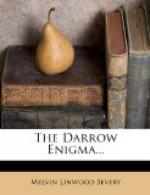I expressed my willingness to do all in my power to aid him, and he left me. The next morning’s papers contained the advertisement and I had several calls in answer to it. These would have caused me much inconvenience had I not explained the whole ruse in confidence to a medical friend who made a specialty of the treatment of cancers, and persuaded him to come to my office during the hours specified in the advertisement. When a patient would call I would satisfy myself that it was neither the person we were searching for, nor anyone sent by him to make inquiries, and then turn him over to my colleague, Dr. Rhodes. It would never have occurred to me to interest myself in any patient who did not answer the description given me by Maitland, had he not especially cautioned me in this regard.
“We have,” he said, “to deal with a man possessed of ability of no common order. We have already seen that he never runs a risk, however slight, which he can avoid. It is more than likely, therefore, if our advertisement meets his eye and interests him, he will inquire into it through some second party. Again, we are by no means certain that his interest in cancers is a purely personal one. Perhaps it is a wife, a sister, or some other relative who is afflicted. In this case we could hardly expect him to come himself. Let me caution you, therefore, to closely scrutinise all applicants and question them until you are satisfied they are in nowise connected with the man for whom we are searching.”
I followed this advice most carefully and had no difficulty in convincing myself that none of my callers had any relation whatsoever with the murderer of John Darrow. This order of things was continued for several days with the same result. In the meantime Maitland was working upon a new clue he had discovered. He would tell me all about it, he said, when he had followed it to the end. This was on Tuesday. On Friday he came to the house and informed us that he had met a man who had known a M. Henri Cazot, a Frenchman whose description seemed to tally perfectly with nearly all we knew of Mr. Darrow’s murderer.
“It came about in this way,” Maitland began in response to Gwen’s request that he should tell us all about it: “I determined to thoroughly search every book on the ‘Weltz-Rizzi’ list, to see if I might not get some additional clue. In the work by Robert Houdin entitled ‘The Sharper Detected and Exposed’ I found the statement that gamblers often neutralised a cut in a pack of cards by a rapid and dexterous sleight. This, the book went on to say, was accomplished in the following manner: When the cards are cut and left in two packets upon the table, the sharper picks up with his right hand the parcel of cards which was originally at the bottom of the pack. This is brought above the other packet, as in an honest cut, but, just before releasing the cards, the lower parcel is deftly tilted up by inserting the right little finger under it,




